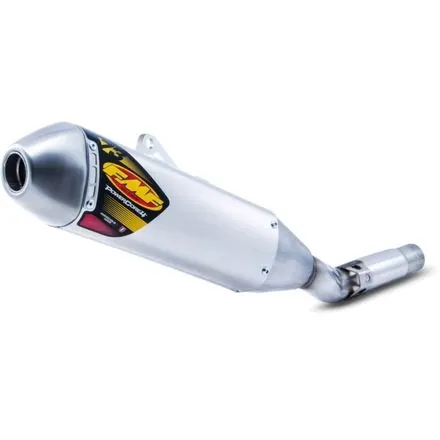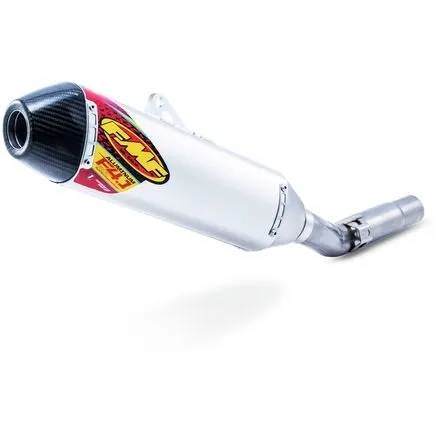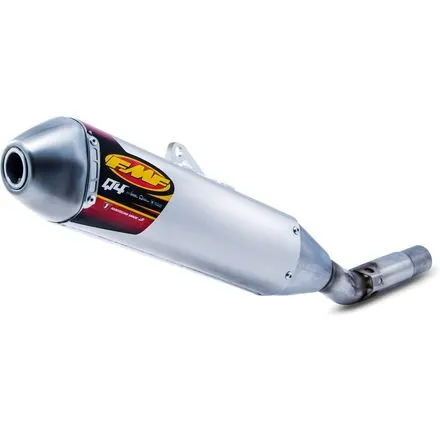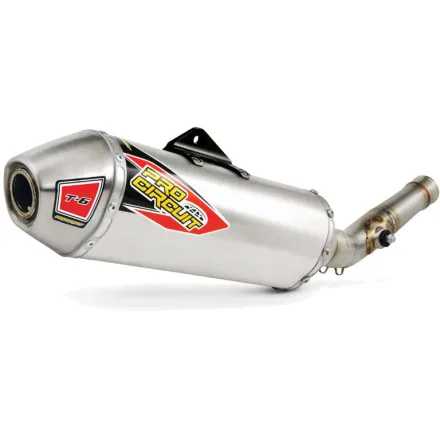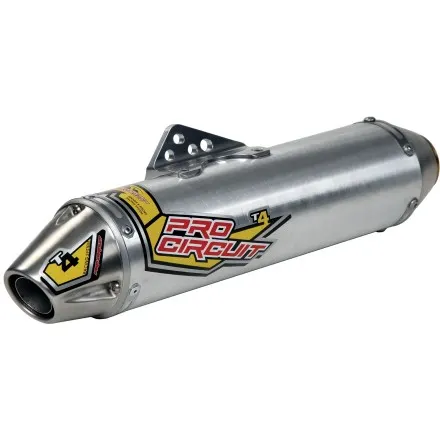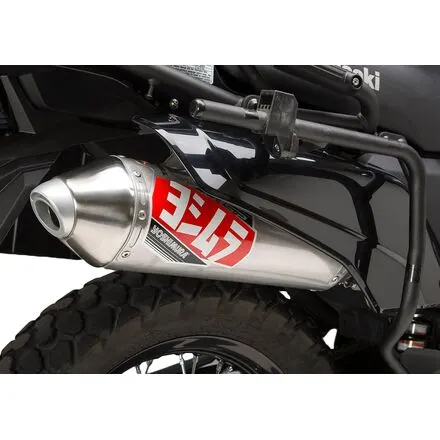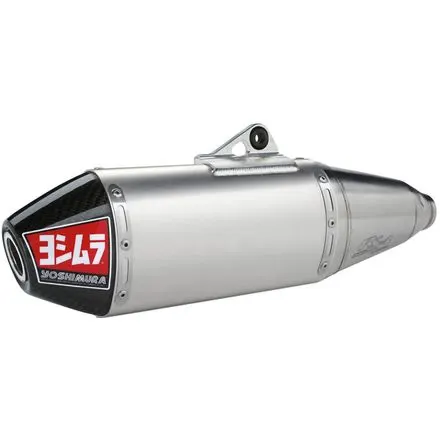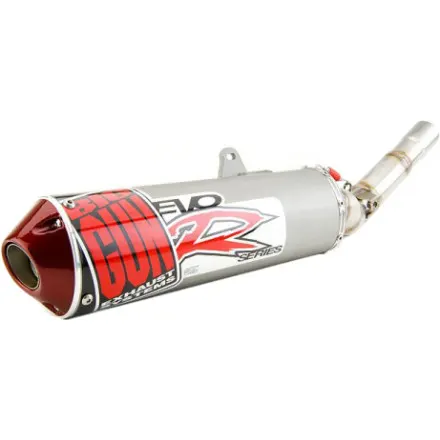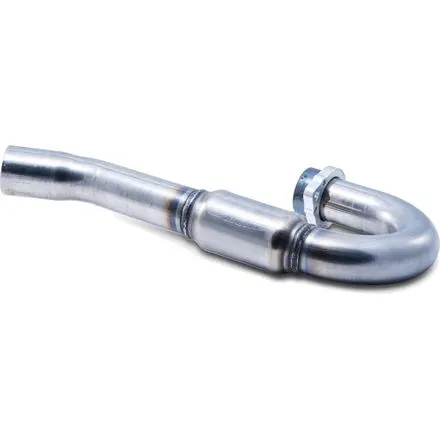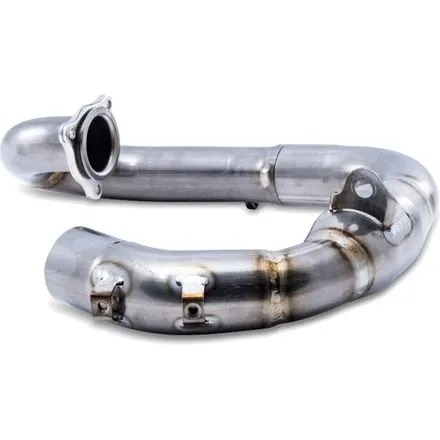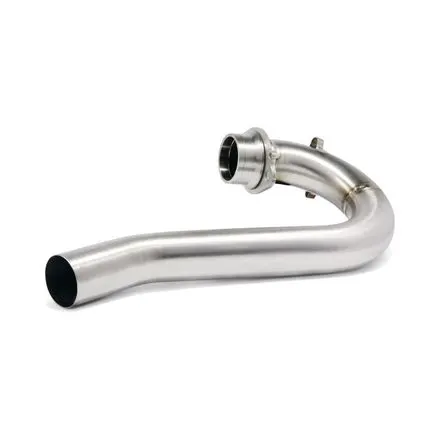Trying to find the best 4 stroke dirt bike exhaust but not sure where to start? Whether you want more power, better looks, more noise, less weight, or all of the above, there is likely an option for you.
In this article, you’re going to learn what a different exhaust will actually do to your 4 stroke dirt bike, why you may or may not want to spend the money on one, and how to choose the best pipe or muffler based on your specific needs and budget.
Is an aftermarket exhaust good for your dirt bike?
Installing an aftermarket exhaust pipe or system can be good for your dirt bike, but it really depends on the exhaust, what your goals are, and how it’s tuned.
For example, some exhaust systems greatly affect the air-fuel ratio, potentially making your dirt bike run leaner or richer at certain throttle openings. This can damage your engine or just make riding frustrating because it takes 20 kicks to start it or have an unreliable throttle response.
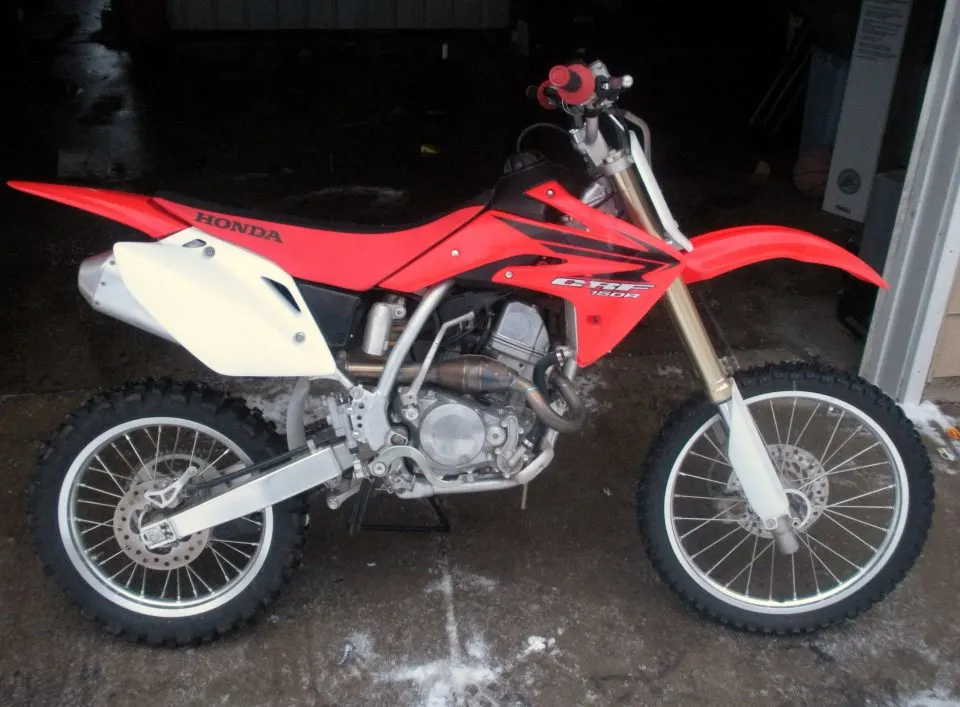
Does adding an exhaust tip increase HP on a dirt bike?
It really depends on your specific bike because some dirt bikes have a more restrictive stock muffler. For example, a low-performance trail bike may get you a little more throttle response and low-end torque with a different exhaust tip, but it won’t do anything for a high-performance enduro bike.
Does a slip-on exhaust increase horsepower?
This also depends on how restrictive the stock exhaust is. If it’s already a “straight-thru” open-style muffler, then an aftermarket slip-on muffler typically won’t increase the horsepower much, if at all.
However, a trail bike or dirt bike that has a quiet stock exhaust will get a noticeable horsepower or torque increase with a slip-on after it’s properly jetted. A good example would be the WR450F - even though it’s a high-performance enduro bike, the stock muffler is fairly restrictive in order to make it much quieter and meet certain sound/exhaust regulations.
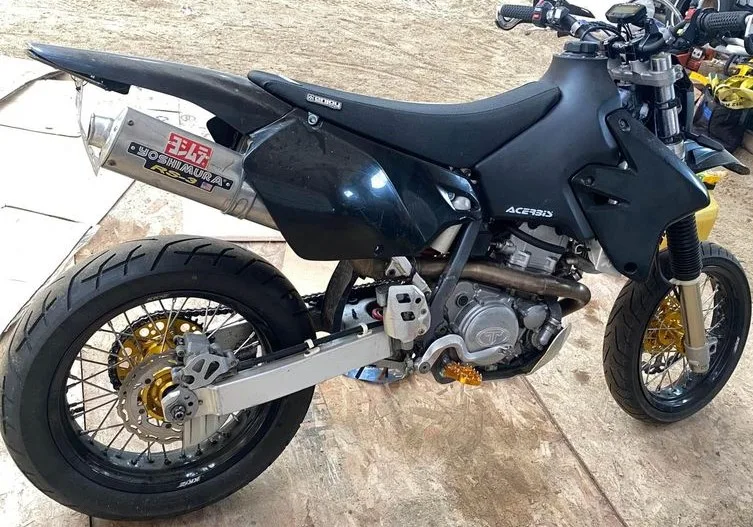
Head pipe vs slip-on muffler - what’s the difference?
A 4 stroke dirt bike head pipe is the exhaust tubing that is connected to the cylinder head and wraps around the engine and goes toward the rear of the bike, which looks different than a 2-stroke expansion chamber. A slip-on muffler is a canister-like part that connects to the header pipe/mid-pipe and is usually bolted to the subframe under the rear fender.
The main difference is that the head pipe controls the exhaust flow coming directly out of the engine and generally has a bigger impact on power, while the slip-on muffler mainly controls the sound output of the exhaust (tone and decibel rating).
Do you need a spark arrestor?
In the United States, you need a spark arrestor if you want to legally ride on state trails. While a spark arrestor is simply a screen or device to prevent any sparks from exiting the exhaust system, you need a USFS-approved spark arrestor to technically be legal.
Some dirt bikes come with an approved muffler already, otherwise, you’ll have to buy an aftermarket spark arrestor slip-on/muffler.
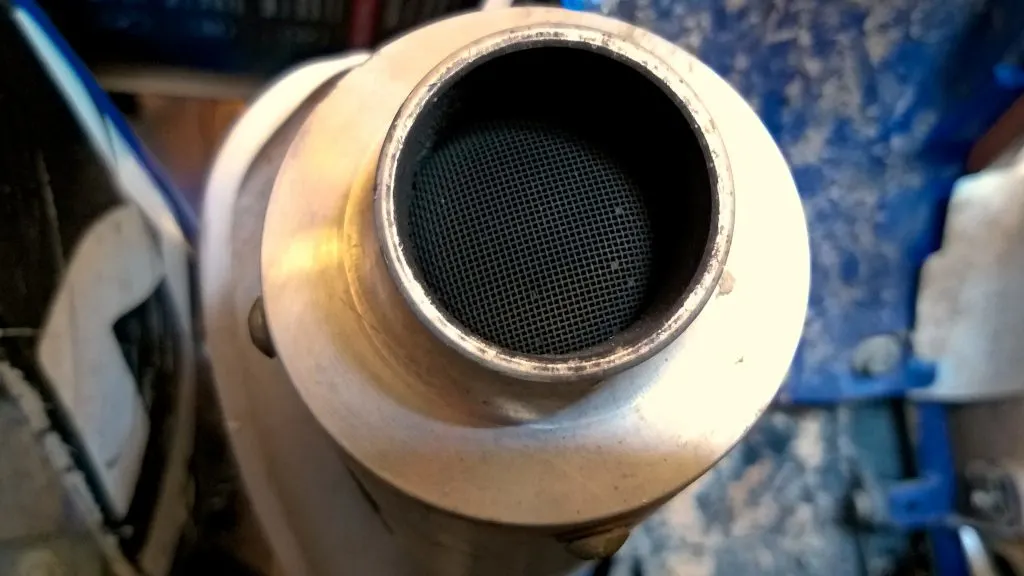
How can I make my dirt bike exhaust louder?
To make your 4 stroke dirt bike louder, you can:
- Remove the exhaust tip (if possible)
- Remove the muffler
- Remove the exhaust
- Install a louder aftermarket muffler
But first, you have to ask yourself: “Why do I want a louder dirt bike?” Yes, it may sound cooler or get more attention, but there are many drawbacks to having a louder exhaust.
I’m not completely against loud dirt bikes, but these are some legit reasons why you shouldn’t make your dirt bike louder:
- It’s annoying - you may not care, but other people may find your loud bike annoying, which gives us dirt bikers a bad name
- Less power - More noise doesn't always equal more power, especially if it's not properly tuned
- It’s exhausting (no pun intended) - Riding a loud bike is deceivingly exhaust to you as the rider because your ears aren't made to hear that for long periods of time
- More likely to get shut down - Tracks & trails get more complaints about "loud bikes" than almost anything else, causing them to get shut down - FOREVER
- Intimidates little kids - Most kids don't like loud noises, which can scare them into going off course and crashing
Stainless steel vs titanium exhaust - which is better for your dirt bike?
The main difference is that titanium is typically a much lighter exhaust than a stainless steel pipe, but titanium is also more costly because it’s a less common metal. It can also be more colorful after heating up from running the engine.
As far as performance goes, the power is virtually identical if a stainless exhaust has the same dimensions as a titanium exhaust. It’s usually just the head pipe and mid-pipe that are SS or Ti, and the muffler is usually aluminum, carbon fiber, or a composite (mixture of both).
Is “Ti exhaust” worth it?
For most people, the difference in weight between a Stainless and titanium dirt bike pipe is NOT worth the price tag. If you want to ride faster or just safer, then your money is better spent on improving your riding technique.

What are the downsides of titanium dirt bike exhaust - do they crack?
Since titanium is a stronger metal than stainless, it can be made thinner - hence why it’s generally much lighter. However, since a Titanium pipe is thinner, it’s more likely to get dented or break if it hits something, such as a rock, or directly impacts the ground or another object.
This is another reason why Stainless is better if you’re on a tight budget and don’t want to risk denting or cracking your dirt bike exhaust with a titanium setup.
Stainless steel vs aluminum dirt bike exhaust - which is better?
When comparing stainless vs aluminum exhaust on a 4 dirt bike, it’s generally the muffler because aluminum isn’t a common material for the head pipe because it has a lower melting point.
With that said, aluminum is much lighter while stainless is typically more durable because it’s a harder metal that’s less likely to bend or break.
The power difference between alum and SS is virtually identical, but nowadays most 4 stroke dirt bike mufflers are either aluminum or carbon fiber because stainless is so heavy.
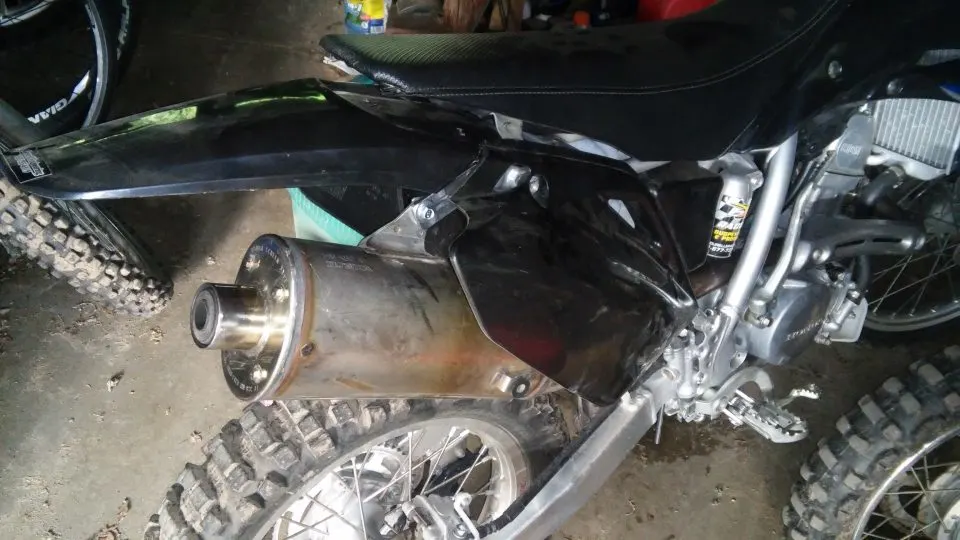
Best dirt bike exhaust brands
There have been many companies that have made aftermarket 4 stroke dirt bike exhaust systems over the decades, but these are the top brands today:
- Akrapovic
- Big Gun
- Dr. D
- FMF
- Leo Vince
- Pro Circuit
- Two Brothers
- Yoshimura
Loudest 4 stroke dirt bike exhaust
Making your 4 stroke dirt bike exhaust louder is usually not hard to do, but my question to you is: “Why?” I’m not completely against a loud dirt bike exhaust system because it can sound cool, but in most cases, they are not helpful to you, other riders, or anyone near you while riding.
With that said, the loudest 4 stroke dirt bike exhaust options are:
- Remove the stock end cap (if it has one that’s removable)
- Remove/cut off the stock baffle/insert (if it has one)
- Remove the stock muffler - you’ll most likely lose a lot of power
- Replace with an aftermarket exhaust with a straight-through muffler design with a large outlet
The stock exhaust on most modern dirt bikes is actually pretty good, so choosing one of the above options won’t actually gain you much horsepower, if any, especially if you don’t adjust the jetting or fuel mapping (on EFI dirt bikes).
A louder aftermarket might get you a little bit more power, but it usually just shifts the power curve around on most modern 4 stroke dirt bike ends, such as more low-end torque or top-end horsepower and over rev.
Best sounding 4 stroke exhaust
The best sounding exhaust is very subjective, meaning everyone has a different opinion. If you like quiet, then a stock 4 stroke dirt bike exhaust may sound the best to you.
If you want a different-sounding exhaust, then changing or modifying the muffler will make the most difference - a head pipe won’t change the sound much, if at all.
Here are some of the top sounding aftermarket 4 stroke exhaust systems:
- FMF Factory 4.1 (Motosport)
- Pro Circuit T-6 (Motosport)
- Yoshimura RS12 (Motosport)
It also depends on the condition of your exhaust. For example, if the muffler packing as all burned away (a normal maintenance item to replace), then any muffler will sound raspy, rough, and not crisp.
What 4 stroke exhaust gives most horsepower?
First of all, where do you want more power? If you want top-end horsepower for racing, then you’ll need an exhaust that’s made for high RPM.
On the flip side, for bottom-end and midrange torque, you’ll want a pipe that’s tuned for lower RPM riding. Either way, you'll want a fully tuned exhaust (head pipe and muffler) that's specifically tuned for your 4 stroke dirt bike engine to give you the most horsepower.
For example, a cheaper Chinese-made exhaust from Amazon or a more affordable pipe from an aftermarket exhaust company usually won't perform quite as well as their top-tier exhaust because they don't spend as much time dyno-tuning and testing for every specific dirt bike model.
Not all exhaust systems are the same for every bike
An FMF Powercore muffler might make a bigger improvement on a Yamaha TTR230 trail bike than it will on a YZ250F motocross bike even though it’s basically the same part - or is it?
You see, motocross bikes already come with a high-performance exhaust system that’s tuned very well for the broadest power curve. This means that replacing the head pipe or muffler won’t give you a big increase in power - it usually just shifts the power around.
More power potential on a trail bike
A TTR230, on the other hand, is a low-performance trail bike that’s tuned to be as quiet as possible, so there’s more room for power improvement when upgrading to an aftermarket exhaust.
Both bikes may only gain 1 horsepower with a “performance exhaust”, but it will be more noticeable on the TTR230 because it’s a bigger percentage gain.
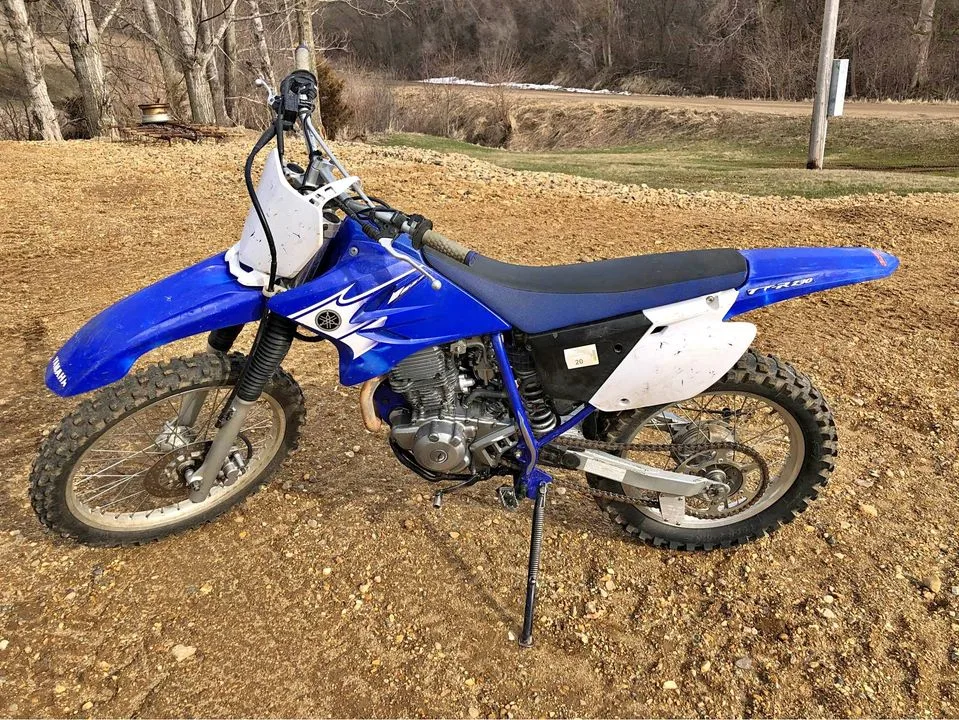
Horsepower gain vs percentage gain
Everyone likes “Dyno numbers” and charts (I do too, occasionally), but they don’t always mean a whole lot when it comes to actually riding your bike. In fact, you might be disappointed if you found out that your new $1200 exhaust system only gave you 0.5 HP more peak horsepower, which is quite common on modern 4 stroke dirt bikes.
What you might not realize is that you got a 10% boost in low-end & midrange torque (theoretically speaking), which is quite a bit. You see, it’s important to look at the “percentage gained” vs “actual horsepower number.
For example, if your TTR230 has 18 HP and a new exhaust system bumps it up to 19.5 HP, that’s over an 8% power gain, but it might be even higher at a lower RPM. Maybe at 3000 RPM it went from 5 HP to 6 HP, which is a 20% gain (again, this is theoretically speaking - those may not be the actual numbers).
Best cheap/free exhaust upgrade
Depending on your current exhaust system setup, there may be a couple of things you can do to improve power output for cheap or free. Most of these mods will only work on a trail bike or older model 4 stroke dirt bike with a more restrictive exhaust.
Remove baffle/insert
If your four-stroke dirt bike is very quiet and it has a removable insert, baffle, or end cap on the end of the muffler, you could get a noticeable improvement in throttle response and torque or horsepower. The downside is that it will usually be much louder as well as possibly removing your USFS-approved spark arrestor system (depending on your muffler).
If your bike is harder to start or runs worse with backfiring on deceleration, then you’ll need to tune the jetting, which you can learn how to tune the fuel screw in a few minutes here.
Aftermarket end cap
If you want to remove the restrictive end cap but still want it to look nice (or better), an affordable billet exhaust tip/end cap (Amazon) is easy to bolt in, but this upgrade only works on some mufflers with the 3-bolt end cap.
Remove stock head pipe/midpipe restriction
Some trail dirt bikes have a very restrictive head pipe and/or mid-pipe, but it’s only on specific models (research your own bike). For example, the Honda CRF230F uses the same head pipe as the CRF150F, which means there’s definitely room for improvement, but it’s also choked where it enters the muffler.
If there’s a “Ring” or a “weld spot” that you can grind down or cut out without ruining the pipe, this is a free/cheap mod that can give you another 1% improvement. Yes, it’s not a lot, but if you have 15 mods that give you an extra 1%, that’s 15% better than stock!
Best 4 stroke pipe and mufflers for racing/competition
There are many different exhaust pipes, mufflers, and combinations you can buy these days, but the best exhaust really comes down to your budget and what your preferences are.
These are the main advantages of upgrading your 4-stroke exhaust system:
- More power
- Better sound
- Louder
- Less weight
- Better looks
FMF Powercore 4
The FMF Powercore 4 slip-on (Amazon) has been around for many years because it’s a good combination of better performance, sound, and value. It doesn’t have the high-tech materials as the 4.1, making it slightly heavier, but it’s still generally a decent improvement over a stock muffler on most models.
Most models also come with a removable spark arrestor, making it legal to ride on trails.
FMF Factory 4.1
Available for most MX and enduro bikes, the Factory 4.1 slip-on (Amazon) is FMF’s top-tier muffler. It’s quieter than most stock mufflers while still giving you more power.
It’s also much lighter with “aerospace-grade materials” (most likely titanium and high-quality stainless). These mufflers are all made in California, so you get what you pay for in quality and performance.
The end cap design is also more convenient because it’s easier to add or remove their quiet insert or spark arrestor (Amazon) if you are trail riding or need to meet a lower sound decibel test.
FMF Q4
If you live in a noise-conscience area or need an even lower sound output, the FMF Q4 (Amazon) slip-on muffler is a great choice for modern enduro and MX bikes because it’s quieter without losing much, if any power compared to stock.
Instead of choosing a different muffler and plugging it up with a quiet insert, the Q4 already comes quieter with a built-in spark arrestor to ride on trails or race off-road where sound testing is more strict.
Pro Circuit T6
The PC T-6 slip-on (Amazon) is Pro Circuit’s latest option for exhaust performance upgrades, so it’s a good choice if you have the most money to spend on the latest technology. You’ll get the best power improvement, and weight reduction, as well as a better sound and quality fitment.
Pro Circuit T4
For a good combination of power, sound, and value, the T4 slip-on (Amazon) usually won’t disappoint. It's an easy and more affordable way to get more power and a better-sounding exhaust.
Yoshimura RS2
The Yoshimura RS2 (Amazon) is a mid-price exhaust that will give you a good combination of power, weight reduction, and sound, at a reasonable price. It’s noticeably quieter than most competition mufflers while still providing a nice increase in overall torque and horsepower.
Yoshimura RS4
The RS-4 exhaust from Yoshimura (Amazon) is the next step up in technology, such as less weight, increased performance, and ease of installation. You get what you pay for, so this is noticeably more expensive than the RS-2 exhaust.
Big Gun Evo R
If you want more power than your stock exhaust or a cheap Amazon exhaust, a Big Gun Evo R exhaust (Amazon) is a pretty good choice without spending a small fortune. On most models, you get better throttle response, low-end torque, and an overall increase in power when jetted properly.
The two biggest drawbacks are: it’s loud, and fitment quality isn’t always as good as the top name brand 4-stroke exhausts. However, a quiet insert and a trail-legal spark arrestor (Amazon) can be added to get it within most legal sound requirements.
FMF Powerbomb header
An upgraded head pipe will improve power on virtually any trail bike, but most stock motocross bikes already have a well-tuned header pipe, so you may not notice much improvement if you have a new YZ250F (for example).
The original Powerbomb head pipe (Motosport) is one of FMF’s most popular four-stroke pipes because it can make more power than stock while reducing sound thanks to its “pre-muffler” design.
FMF Megabomb header
The FMF Megabomb header (Motosport) is an updated version of the Powerbomb head pipe.
The shorter length gives you better over-rev, while the larger midsection increases exhaust flow at lower RPM to improve throttle response and torque, all while reducing sound output due to its larger midsection.
You can get it in Stainless steel for better durability, or Titanium if you want to spend more to reduce weight.
PC T4 head pipe
For simple bolt-on performance, the Pro Circuit T-4 head pipe (Motosport) is an easy way to get more low-end and midrange torque. It doesn’t have any fancy looks or gimmicks - it just bolts on and works.
Best 4 stroke dirt bike exhaust for trail riding
Best slip-on mufflers for trail riding:
- Stock - Free/cheap, quiet, good overall power
- FMF Q4 (Amazon) - Quietest aftermarket exhaust
- FMF Powercore 4 w/ quiet insert (Motosport) - Improved power with a louder sound level
- Yoshimura RS-2 w/ quiet insert (Motosport) - Good power with moderate sound output
- Pro Circuit T-5 w/ quiet insert (Motosport) - Good power with low/moderate sound output
Best head pipes for trail riding:
- Stock - Free/cheap, good overall power (most models)
- FMF Powerbomb (Motosport) - Less sound with same or slightly better power
- FMF Megabomb (Motosport) - Similar to Powerbomb but with slightly more performance
- Pro Circuit T-4 (Motosport) - Better low-end and midrange torque
Quietest 4 stroke dirt bike exhaust
If you have a 4-stroke air-cooled trail bike, such as a TTR230, KLX140, or CRF125F, the quietest exhaust system is going to be your stock head pipe and muffler. The stock muffler is made to meet very low sound level requirements (usually 85-90 decibels).
The quietest aftermarket exhaust options (for trail, enduro, or MX bikes) are:
- FMF Q4 (Motosport)
- PC T-5 w/ quiet insert (Motosport)
- FMF Powerbomb header (Motosport)
- FMF Megabomb header (Motosport)
Do you need to re-jet the carburetor after installing an aftermarket exhaust?
It really depends on your specific dirt bike, what exhaust you use, and how it’s currently tuned. In most cases, adjusting the carb jetting is necessary if you want the best performance, as well as easy starting, reliable throttle response, and engine reliability.
Since changing the head pipe or muffler alters the exhaust flow, it also changes the air-fuel ratio. This means that the engine might be getting too much or not enough fuel to efficiently and properly burn the mixture, giving you unwanted symptoms, such as hard starting or backfiring.
Want to learn how to get started in just a few minutes? Click here to get my fuel screw tuning guide today for FREE.


